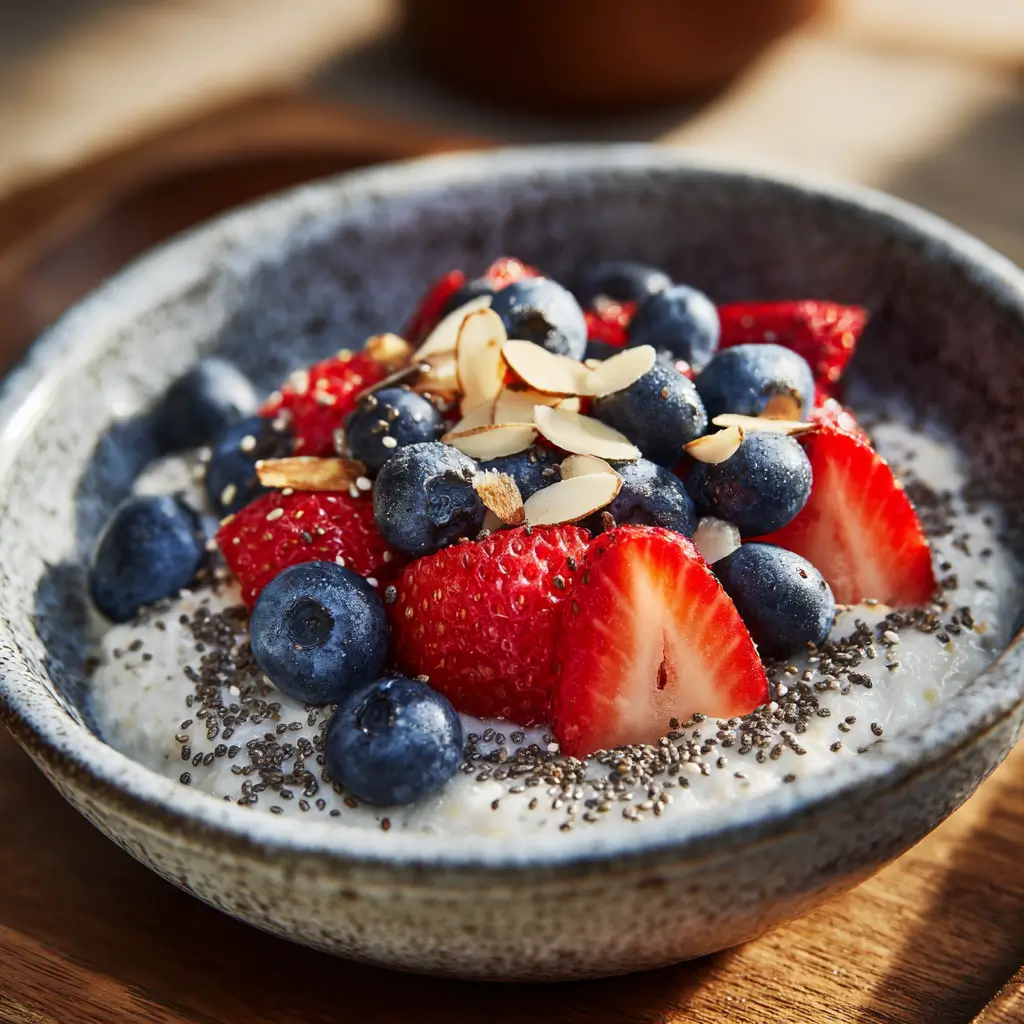
A high-protein cottage cheese breakfast is one of the simplest and most powerful ways to kick-start your morning. Packed with protein, low in carbs, and full of versatile flavor combinations, cottage cheese has become a favorite among fitness enthusiasts, busy parents, and anyone who wants a quick, nutritious meal. Whether you’re aiming for weight loss, building muscle, or just staying full until lunch, this protein-rich dairy food can be your best friend. In this article, we’ll explore why cottage cheese is such a great choice, how much protein it contains, and the best ways to enjoy it with creative recipes and mix-ins. You’ll also find meal prep ideas, FAQs, and science-backed reasons to add cottage cheese to your breakfast rotation.
Looking for inspiration? Try this guide to a 5-minute cottage cheese breakfast that’s quick and satisfying before diving into more ideas below.
Table of Contents
Table of Contents
Why Choose a High-Protein Cottage Cheese Breakfast?
The Nutritional Power of Cottage Cheese
Cottage cheese isn’t just another breakfast trend—it’s a nutritional powerhouse. A half-cup serving typically provides around 12–14 grams of protein, making it one of the highest protein options in the dairy aisle. Unlike sugary breakfast cereals or pastries that lead to energy crashes, cottage cheese delivers slow-digesting casein protein. This keeps you full longer and helps stabilize blood sugar.
It’s also packed with vitamins and minerals. Calcium supports bone health, B vitamins help convert food into energy, and phosphorus plays a role in muscle function. For those who track macros, cottage cheese is a flexible choice—it comes in full-fat, low-fat, and fat-free varieties, so you can fit it into almost any eating plan.
Another bonus? Cottage cheese is naturally low in carbs, making it ideal for low-carb or keto-friendly breakfasts. That’s why so many people now swap their bagels or pancakes for a cottage cheese bowl topped with fruit, nuts, or seeds.
Benefits of Starting Your Day with Protein
Starting your morning with a high-protein cottage cheese breakfast does more than satisfy hunger—it sets the tone for the rest of your day. Protein plays a crucial role in:
- Muscle recovery and growth: Essential if you exercise regularly or want to preserve muscle while losing fat.
- Satiety and weight management: Protein keeps you fuller for longer, reducing snacking and overeating later in the day.
- Blood sugar balance: Unlike carb-heavy breakfasts, protein helps keep energy levels stable.
- Brain function: Amino acids from protein contribute to focus, memory, and mood regulation.
Research consistently shows that people who eat a protein-packed breakfast are less likely to overeat at lunch and dinner. By choosing cottage cheese, you’re setting yourself up for better energy, improved metabolism, and sustained fullness throughout the morning.
Protein Content in Cottage Cheese Explained
How Much Protein Is in Cottage Cheese?
Cottage cheese shines as one of the top dairy choices for protein. A single cup of low-fat cottage cheese contains around 25–28 grams of protein—that’s equivalent to eating four large eggs. Even a smaller half-cup portion gives you 12–14 grams, which is more than enough to build the base of a high-protein breakfast.
Not all cottage cheese brands are created equal, though. Some variations contain more whey, while others lean toward casein, which digests slowly. If your goal is muscle repair and long-lasting satiety, casein-rich cottage cheese is especially beneficial.
| Serving Size | Protein (g) | Calories | Fat (g) | Carbs (g) |
|---|---|---|---|---|
| ½ cup low-fat | 12–14 | ~80 | 1–2 | 3–4 |
| 1 cup low-fat | 25–28 | ~160 | 2–4 | 6–7 |
| 1 cup full-fat | 23–25 | ~210 | 10–12 | 6–8 |
As you can see, whether you prefer full-fat creaminess or lighter low-fat options, you’ll always get a protein-packed meal.
Comparing Protein in Cottage Cheese vs Greek Yogurt & Eggs
When most people think “high-protein breakfast,” they picture eggs or Greek yogurt. Cottage cheese deserves a spot in that lineup.
- Greek yogurt (1 cup): ~17–20 grams of protein
- Eggs (2 large): ~12 grams of protein
- Cottage cheese (1 cup): ~25–28 grams of protein
Clearly, cottage cheese takes the lead. Plus, it offers more versatility since you can go savory or sweet. That’s why more health enthusiasts are switching from yogurt to a high-protein cottage cheese breakfast bowl.
Easy High-Protein Cottage Cheese Breakfast Ideas
Sweet Breakfast Bowls with Fruit & Nuts
If you like starting your day on a sweet note, cottage cheese works perfectly with fresh or frozen fruit. Try pairing it with berries, bananas, or pineapple for natural sweetness. Add in almonds, walnuts, or chia seeds for crunch and an extra protein boost. A drizzle of honey or maple syrup makes it taste indulgent while still being healthy.
One of the best combos is a cottage cheese berry protein bowl—½ cup cottage cheese, a handful of blueberries, sliced almonds, and a sprinkle of cinnamon. It tastes like dessert but fuels you like a power meal.
Savory Options: Eggs, Avocado, and Toast Pairings
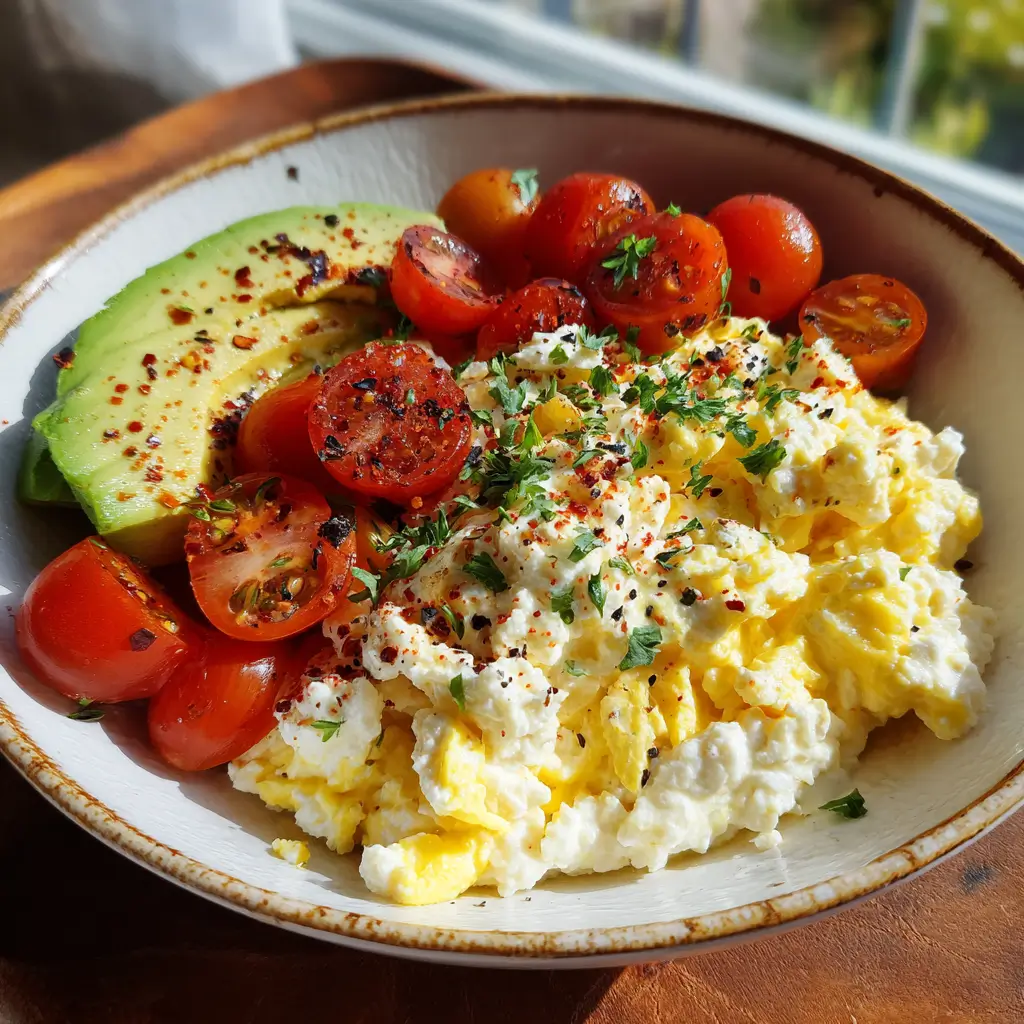
Not into sweet breakfasts? Cottage cheese also fits seamlessly into savory plates. Spread it on whole-grain toast, top with avocado slices, and finish with a sprinkle of sesame seeds. Or scramble eggs and mix in cottage cheese for extra fluffiness and protein.
For busy mornings, prep a savory cottage cheese bowl with cherry tomatoes, cucumbers, and smoked salmon. It’s quick, delicious, and keeps you energized. Check out these low-carb cottage cheese breakfast ideas for more savory inspiration.
How to Get 30g of Protein for Breakfast with Cottage Cheese
High-Protein Combinations with Cottage Cheese
Hitting 30 grams of protein before noon is easier than it sounds with cottage cheese. Here are a few simple combos:
- 1 cup cottage cheese (26g protein) + 1 tbsp chia seeds (2g protein) + 1 tbsp almond butter (2g protein) = 30g total
- ½ cup cottage cheese (13g protein) + 2 scrambled eggs (12g protein) + 2 tbsp hemp hearts (6g protein) = 31g total
- 1 cup cottage cheese (26g protein) + ½ scoop whey protein (6g protein) = 32g total
These combinations don’t just hit your protein target—they also balance healthy fats, fiber, and micronutrients.
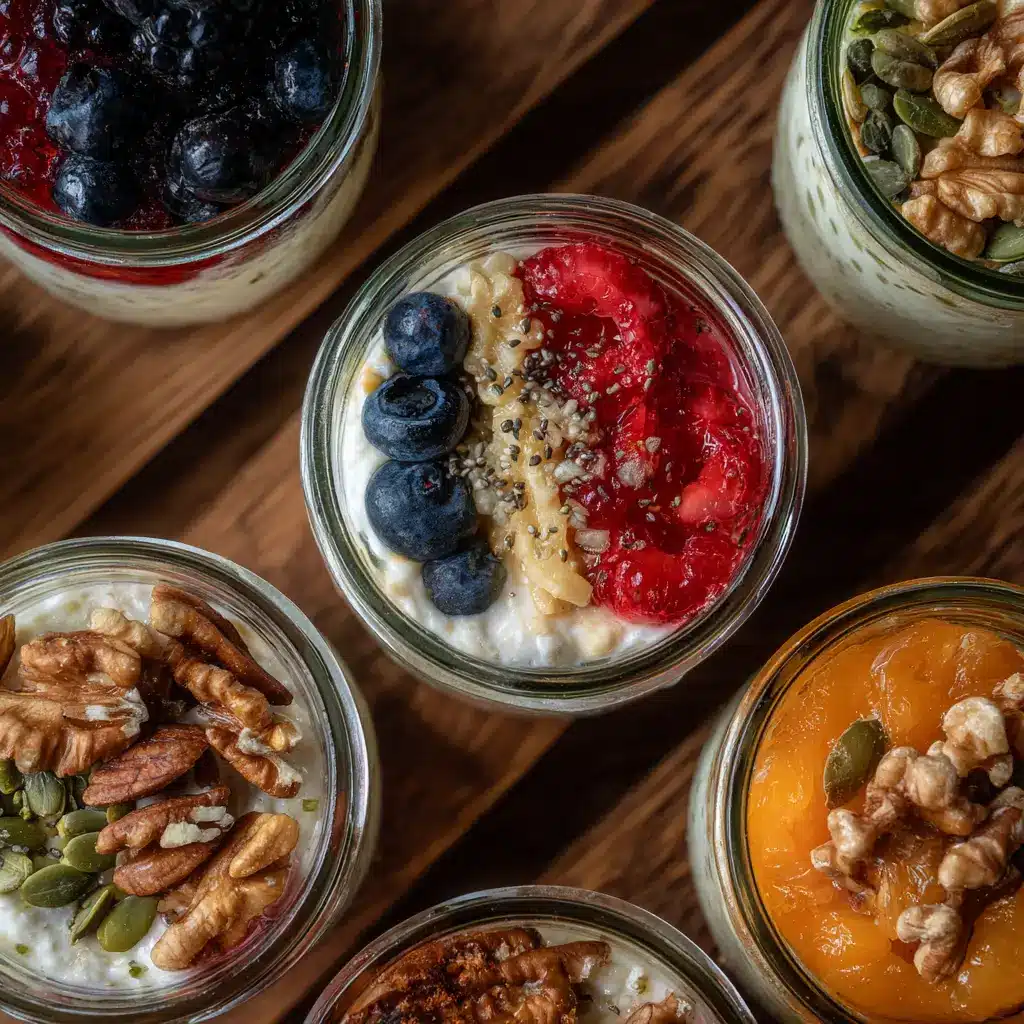
Sample 30g Protein Breakfast Meal Plan
If you’re looking for a routine to follow, here’s a quick 30g protein cottage cheese breakfast meal plan:
| Day | Recipe | Protein (g) |
|---|---|---|
| Monday | Cottage cheese + eggs + avocado | 32 |
| Tuesday | Cottage cheese + protein powder smoothie | 34 |
| Wednesday | Savory bowl with smoked salmon | 31 |
| Thursday | Sweet bowl with chia seeds + nuts | 30 |
| Friday | Pancakes made with cottage cheese | 33 |
Don’t miss our cottage cheese breakfast for kids if you want family-friendly versions that pack in protein, too.
Best Mix-ins to Boost Cottage Cheese Protein
Nuts, Seeds, and Nut Butters
Cottage cheese already delivers a big protein punch, but you can easily boost it with the right add-ins. Almonds, walnuts, pistachios, or cashews provide extra protein and healthy fats. Seeds like chia, flax, and pumpkin seeds not only up the protein but also add fiber and omega-3s.
Nut butters—like almond, peanut, or cashew—make your bowl creamier and more filling. A tablespoon adds 3–4 grams of protein while enhancing flavor.
Protein Powder, Chia Seeds, and Hemp Hearts
If you want the simplest way to increase protein, mix a half scoop of vanilla or chocolate whey protein into your cottage cheese. It turns into a sweet, dessert-like bowl while easily adding 10–15 grams of extra protein.
Chia seeds and hemp hearts are great plant-based boosters. Two tablespoons of hemp hearts add 6 grams of protein, while chia seeds add 2–3 grams plus fiber to keep you full longer.
Discover great ideas like this dairy-free cottage cheese breakfast if you’re lactose-sensitive but still want to keep protein high.
High-Protein Cottage Cheese Meal Prep Ideas
Make-Ahead Breakfast Bowls & Jars
One of the easiest ways to stay consistent with a high-protein cottage cheese breakfast is by prepping ahead. Cottage cheese holds up well in the fridge, making it perfect for grab-and-go meals. Try layering cottage cheese, fruit, and granola in mason jars for a week’s worth of ready-to-eat breakfasts. Add nuts or seeds at the last minute to keep them crunchy.
Another smart approach is creating savory meal prep bowls. Mix cottage cheese with chopped veggies like bell peppers, cucumbers, and spinach. Store in airtight containers, and you’ll have healthy, protein-rich meals waiting in the fridge.
Time-Saving Prep Tips for Busy Mornings
If mornings feel rushed, here are some time-saving tricks:
- Pre-portion cottage cheese into single-serving cups.
- Keep a “topping station” with pre-cut fruit, nuts, and seeds.
- Freeze smoothie packs with fruit and spinach—just add cottage cheese and blend.
Don’t miss our cottage cheese breakfast guide for even more prep-friendly variations.
Health Benefits Beyond Protein
Cottage Cheese for Gut Health & Weight Management
While most people love cottage cheese for its protein, it brings other benefits too. It’s rich in probiotics (especially live-culture varieties), which can help improve gut health and digestion. For weight management, cottage cheese is a standout choice because its slow-digesting protein keeps you satisfied for hours, reducing mid-morning cravings.
Studies also show that eating high-protein breakfasts helps regulate appetite hormones, making you less likely to overeat later in the day. Combined with its low calorie count, cottage cheese is an excellent ally for sustainable weight loss.
Supporting Muscle Growth & Recovery
If you hit the gym, cottage cheese should be in your meal plan. Its protein is rich in branched-chain amino acids (BCAAs), especially leucine, which directly supports muscle repair and growth. Athletes often enjoy a high-protein cottage cheese breakfast after workouts to fuel recovery.
Pairing cottage cheese with carbs (like fruit or oats) also helps restore glycogen stores, ensuring your body is ready for the next training session.
Creative Cottage Cheese Recipes for Breakfast
High-Protein Pancakes & Waffles with Cottage Cheese
Believe it or not, cottage cheese can be blended into batter for pancakes and waffles. This trick adds fluffiness and doubles the protein content compared to traditional recipes. Combine oats, cottage cheese, and eggs in a blender for a three-ingredient high-protein pancake mix that’s both healthy and delicious.
These recipes are great for meal prepping—you can freeze pancakes or waffles and reheat them throughout the week. Top with fresh fruit and nut butter for a balanced meal.
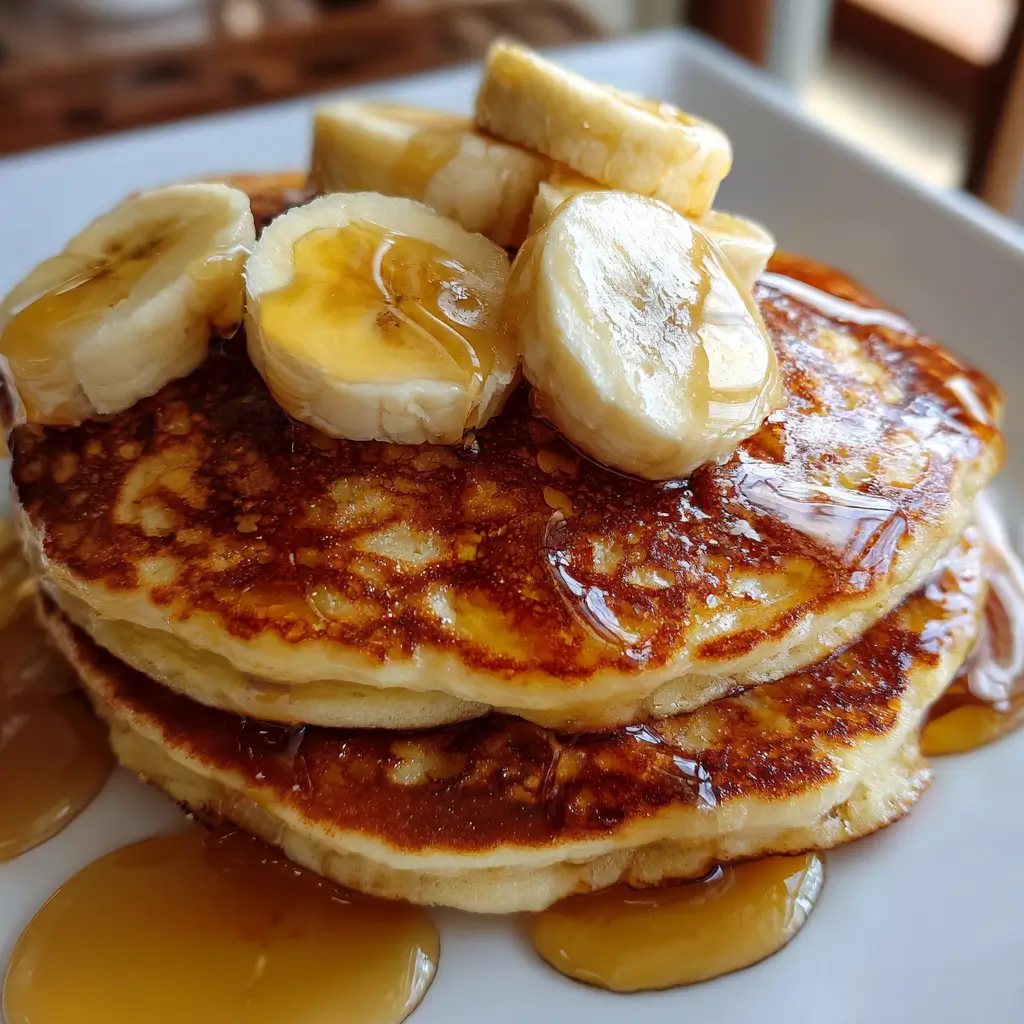
Smoothies, Spreads & Dips Using Cottage Cheese
For something quick and refreshing, add cottage cheese to smoothies. It creates a creamy texture without needing yogurt or milk, while packing in 12–14 grams of protein per serving. Blend with banana, spinach, and peanut butter for a powerhouse shake.
You can also use cottage cheese as a spread or dip. Blend it with herbs and garlic for a savory spread that goes perfectly on toast or crackers. This way, your cottage cheese breakfast stays versatile and never boring.
FAQs on High-Protein Cottage Cheese Breakfast
Is cottage cheese a good protein for breakfast?
Yes—cottage cheese is one of the best protein sources for breakfast. A single cup delivers up to 28 grams of protein, which is higher than Greek yogurt or eggs. It also provides calcium, B vitamins, and probiotics for a balanced start to the day.
How can I get 30g of protein for breakfast?
To reach 30g, combine cottage cheese with other protein-rich foods. For example, 1 cup of cottage cheese (26g) plus 1 tablespoon of chia seeds (2g) and 1 tablespoon of almond butter (2g) easily hits the mark. Adding eggs, smoked salmon, or protein powder can also help.
What can I mix with cottage cheese for breakfast?
Cottage cheese pairs well with both sweet and savory ingredients. For sweet bowls, try berries, bananas, nuts, and a drizzle of honey. For savory, mix with avocado, tomatoes, cucumbers, or smoked salmon.
What to add to cottage cheese for more protein?
You can boost cottage cheese protein content by adding hemp hearts, chia seeds, nuts, protein powder, or even eggs. These additions can turn a simple serving into a protein-packed breakfast bowl with over 30 grams of protein.
Conclusion:
ast isn’t just another health trend—it’s a practical, delicious, and nutrient-dense way to start your day. With up to 28 grams of protein per cup, cottage cheese outperforms many traditional breakfast staples like eggs and yogurt. It’s versatile enough to be enjoyed sweet or savory, works well for meal prep, and helps with satiety, muscle recovery, and weight management.
Whether you mix it with fruit and nuts, turn it into pancakes, or blend it into smoothies, cottage cheese makes hitting your protein goals easy. Add a few smart mix-ins like chia seeds, hemp hearts, or protein powder, and you can effortlessly build a breakfast that fuels your body and mind.
Print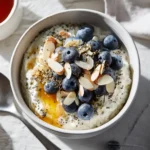
High-Protein Cottage Cheese Breakfast Bowl
- Total Time: 5 minutes
- Yield: 1 serving
Description
A quick and easy high-protein breakfast bowl made with creamy cottage cheese, fresh blueberries, chia seeds, and almonds. Perfect for a nutritious start to your day.
Ingredients
- 1 cup low-fat cottage cheese (26g protein)
- ½ cup blueberries
- 1 tablespoon chia seeds
- 1 tablespoon sliced almonds
- 1 teaspoon honey (optional)
Instructions
- Add cottage cheese to a bowl.
- Top with blueberries, chia seeds, and almonds.
- Drizzle with honey if desired.
- Enjoy immediately as a protein-packed breakfast.
Notes
You can swap blueberries with any fresh fruit of your choice, or add granola for extra crunch.
- Prep Time: 5 minutes
- Cook Time: 0 minutes
- Category: Breakfast
- Method: No-Cook
- Cuisine: American
Want more healthy recipe inspiration and nutrition tips? Follow us on Facebook for daily meal ideas, expert advice, and delicious ways to incorporate both cottage cheese and Greek yogurt into your healthy lifestyle!
